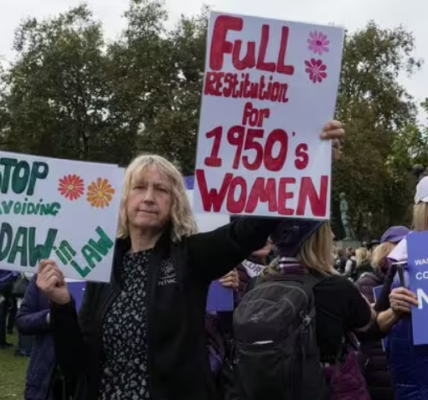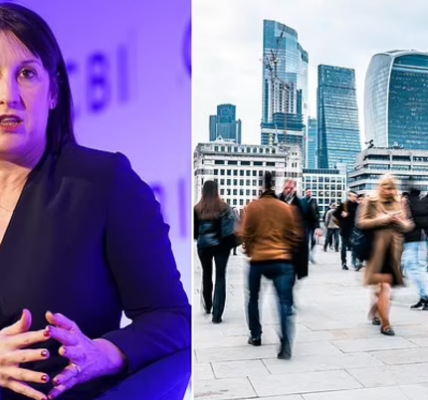EXCLUSIVEFarmers blast Government for ‘screwing British industry’ as they drove their tractors through London to go up against Keir Starmer’s inheritance tax grab_Nhy
Farmers have blasted the Government for ‘screwing British industry’ as they drove their tractors through London as part of their campaign against the inheritance tax raid.
Angry farmers were seen laying a wreath outside Downing Street and blocking Whitehall roads with tractors as part of their protest.
Thousands gathered in London on Wednesday to protest Keir Starmer‘s ‘toxic’ proposals – just weeks after a similar protest saw former Top Gear presenter Jeremy Clarkson lead speeches against the Budget in Whitehall.
Once again, the Government’s plans came under fire on several fronts in Parliament, with critics claiming the new rules would put their businesses, futures and food security at risk.
Kevin, from Milton Keynes in Buckinghamshire, told The Mail: ‘They’re screwing British industry with the steel industry, the car industry and now the farming industry. We are going to be a nation that relies on imports and we will be held to ransom by other countries for food and products.’
The agriculture contractor said farmers feel more ‘bitter’ towards the government compared to last month’s demonstration, adding: ‘It will get to the point where farmers will have no alternative.
As well as lining the streets with their tractors, the protesters also held a minute silence in the Westminster streets ‘for all the farmers who are no longer here’ amid ongoing concern for the wellbeing of those facing the impacts of the changes.

Farmers have blasted the Government for ‘screwing British industry’ as they drove their tractors through London as part of their campaign against the inheritance tax raid

Reform leader Nigel Farage is pictured at the farmers’ protest in London on Wednesday morning

Thousands of farmers lined the streets of Westminster with their tractors to protest Keir Starmer’s ‘toxic’ proposals

Protesters also held a minute silence in the Westminster streets ‘for all the farmers who are no longer here’ amid ongoing concern for the wellbeing of those facing the impacts of the changes
Reform UK leader Nigel Farage, who wore a tweed flat cap and Barbour jacket, told the Mail: ‘Getting victory in campaigns like this does not happen overnight. It has got to be a persistent campaign.’
The Clacton MP called for demonstrations to extend to every market town in Britain that is represented by a Labour MP.
He added: ‘If the farmers keep their peaceful protests up, if we can get small businesses to start speaking up – who are going to be affected by these changes – and get the public on side, you will start to see in a few months’ time a lot of Labour MPs panicking.’
Questioned about how long farmers can sustain their action despite Labour refusing to back down, Mr Farage replied: ‘I don’t think it’s started yet. This is going to grow, grow, grow.’
Farmers face being hit with increasing national insurance costs for employers, forcing up costs again.
Alan Murray, a fourth generation farmer from the Scottish Boarders who has handed control of his land to his son, criticised the policy, adding that the Treasury are ‘not going about the right way’ to sort out the £22billion ‘black hole’ in public finances.
The 74-year-old added: ‘I think the public realise we need farmers. And so do I. We have to keep lobbying. I fear this Government could make a mess of the next two to three years.’
Olly Harrison, a farming vlogger from Merseyside with 144,000 YouTube subscribers and 119,000 TikTok followers who helped plan the last demo, revealed further action is being planned by farmers in the New Year.
The fifth-generation farmer admitted that he will have to cough up £1.8million to pass his farm down to his children.

A supporter of the farmers holds a sign saying ‘Starmer Farmer Harmer’ during the rally

Farmers say the new inheritance tax rules would put their businesses, futures and food security at risk
He said: ‘The mood in agriculture is so low now. There is no motivation. My next door neighbour has been saying to me, ‘Why am I getting up in the morning?’
‘[Labour] are trying to look strong, but it takes a bigger man to admit that they are wrong.’
Jake Allen, a second-year student at Harper Adams University, a specialist provider of higher education for the rural sector, said: ‘Frankly, there is no point in me being in university if there is no industry to go into afterwards.’
However, the 19-year-old from Chesterfield in Derbyshire, who has been working on farms since the age of 12, said the measures announced by Chancellor Rachel in last month’s budget has not put him off from working in agriculture.
He said: ‘For 90 per cent of farmers, it is not about money. It is not like another job. It is a 24/7 job. I know lads who work on farms who do 110-hour weeks. Flat out, constantly.’
Asked about how long the protests will last, he said: ‘It will be until we win or until the industry is decimated. What happens next, I don’t know. It could be a strike.’
Twin sisters Sophie and Nicole, 21, and Bethany, 16, who works on farms in Wiltshire and dream of owning their own land, came to Westminster to ‘protect our futures’ and vowed never to vote Labour again.
Sophie said: ‘This is our livelihood and we don’t appreciate that. It is a way of life. It is unfair. Hopefully they listen.’
Archie, whose family own a fruit in Gloucestershire and plans to own a farm with his girlfriend, told the government to ‘listen to us’.
Simon Court, who took his 12-year-old dog Star to the capital in his tractor from Redhill in Surrey, said: ‘We cannot work around the measures. We are hoping Mr Starmer may consider the errors of his ways.’
The April 2026 start for the IHT raid means that farmers not have time to make use of existing rules to skip inheritance tax by passing on an asset seven years before death.
But 65-year-old Mr Court, who has owned a farm for two decades and is hoping to hand it over to his son, called for ministers for the period to be reduced to four years as an ‘olive branch’.
Gareth, who lives in West Sussex but originally from the Rhondda Valley in South Wales, said: ‘The public are starting to wake up about what is going on. I am amazed by how fast it has picked up.’

A coffin draped in the Union flag appears to be symbolising the death of British farming

Tractors line up near Parliament during Wednesday’s ‘RIP British Farming’ protest, which also features a coffin
The retired building industry worker, who is involved with the Countryside Alliance, said in a message to the PM outside the gates of Downing Street: ‘Listen to the people who thought they were voting for someone else and realise now that you are in denial.’
Labour has said its support for farmers is ‘steadfast’ – but there is ongoing outrage from rural communities about Rachel Reeves‘ announcement that farms will no longer be exempt from paying inheritance tax.
As well as the introduction of a 20 per cent inheritance tax rate on farms worth more than £1 million, Labour are also planning to speed up the phase-out of EU-era subsidies in favour of nature-friendly farming payments.
On Wednesday in the House of Commons Sir Keir Starmer told Prime Minister’s Questions the row is being caused by ‘Tory fearmongering’.
Answering a question from Ed Davey, he said: ‘In relation to inheritance tax, as he knows the threshold is £3 million and the vast majority of farmers will be unaffected despite the fearmongering of the party opposite.’
It comes as a new government report published on Wednesday warned long term declines in ‘natural capital’ – resources such as clean water, healthy soils and wildlife – is a pressing risk to UK food production.
After 13,000 people rallied last month, tractors travelled into the capital from across the country on Wednesday, including from Exmoor, Shropshire, Somerset and the home counties, for the latest protest.
Tax experts have said that up to 75,000 farm owners could be hit by the tax changes.
Dozens of tractors lined up in Whitehall, with the first arriving with much fanfare, honking and drawing cheers from some passersby near Parliament Square in central London.
Some were decorated with signs that read: ‘No farmers, no food’, ‘Not hungry, thank a farmer’, and ‘Save British Farming’.
Another sign read ‘Starmer Farmer Harmer’, and a second one ‘Reeves and Starmer, grave robbers’.
Will Elliott, aged 50, drove his tractor for three hours from his farm near Grafham, south of Guildford in Surrey, to attend the protest. His farm, Whipley Manor Farm, predominantly grows cereal crops and grass that they make into hay.
He said: ‘The industry is already down on its knees and this is just another kick in the teeth. My family have been farming in Surrey for nine generations within about 5 miles. I’m the fourth generation to run our current farm.

Dozens of tractors line up on Whitehall, complete with Union Jack flags and placards

Tractors blocked roads in central London on Wednesday bearing placards criticising Sir Keir Starmer and the government

A man in a Santa Claus costume poses in front of a tractor near Parliament
‘Obviously, the idea is that we want to pass it down to the next generation, but farmers are asset-rich, cash poor, we’re not going to have the money to pay the inheritance tax. In Surrey, for instance, it doesn’t take much to reach the million pounds.’
He argues the Government have been ‘misguided’ on farmers’ ability to pay inheritance tax, forcing farmers to sell parts of their land, cattle, flock, or machinery to afford to pay for the tax.
He said: ‘They got the wrong data and way more farmers are going to be affected than what they say. We’ll lose the fabric of the rural countryside.
‘Farms will get split up, the land is not going to get taken care of, we’ll lose habitat – and more importantly, we’re not going to be able to grow the food if we haven’t got the farms.’
Earlier, farming, land and tax experts told the Environment Committee the policy would unlikely have the intended effect of closing a loophole, which enables wealthy people to buy up agricultural land to avoid inheritance tax.
Dr Arun Advani, director of the think tank CenTax, told MPs it is likely the inheritance tax changes will only ‘slightly’ slow land price inflation.
He said a 20% per cent rate is ‘still much more attractive than other sorts of assets’, meaning farmers will continue to compete with wealthier people purchasing agricultural land for tax purposes.
Asked whether there is unnecessary concern over paying the tax, Jeremy Moody, secretary and adviser at the Central Association of Agricultural Valuers (CAAV), said the strategies ministers have outlined for how farmers will pay the tax over 10 years are ‘simply not realistic’.

Anti-Brexit protester Steve Bray was spotted holding placards during the protest by farmers in Westminster

Hundreds of farmers are expected to arrive in Westminster with tractors on Wednesday in a further protest against inheritance tax changes

Tractors are given a police motorcycle escort as they arrive in Westminster on Wednesday

Farmers protest in Westminster ahead of speeches and a ‘slow drive’
Mr Moody said CAAV modelling shows the cost of paying the tax over a decade could amount to around three-quarters of an extra employee on the business.
‘It is a very significant shock on what the business can actually pay out of earnings, leaving only not much, if anything, left for breakfast or for reinvestment,’ he said.
Stuart Maggs, head of tax and partner at Howes Percival law firm, warned the committee that agricultural estates get a rate of return of about 0.5% to 1%.
‘It simply means this is going to be unaffordable and so farms are going to have to sell land or sell up. And it’s going to happen a lot.’
He later added it will be the ‘unfortunate’ who are most caught by the changes, such as those who die early and those who cannot plan.
‘By any measure that has to be a bad way to draw up a tax,’ he said. ‘To tax the unfortunate I don’t necessarily think is the right way the Treasury should be bringing things together.’
Farming leaders told the committee they had all written to the Prime Minister, asking for a pause and a full consultation to find a solution to the loophole that works for everyone.
Victoria Vyvyan, president of the Country Land and Business Association, said: ‘Let’s stop and think. Let’s not just crash forward, hoping against hope that this will turn out alright or it will turn out differently.’

The government’s changes to inheritance tax, announced in the last budget, have sparked fury in rural communities

Farmers are up in arms about changes which mean they are no longer exempt from inheritance tax

A transporter carrying tractors on Millbank in Westminster, London, ahead of Wednesday’s farming protest

Tractors park up on Whitehall next to the Cenotaph during Wednesday’s protest
Tom Bradshaw, National Farmers’ Union president, started crying as he spoke about the risk that the tax changes pose to farmers taking their lives.
‘No policy should ever be published that has that unintended side effect,’ he said.
Addressing arguments that money does not necessarily trigger this response, he became emotional as he said: ‘It’s not money. This is a lifetime of work, it’s the heritage and the custodianship of their farm.’
Asked whether Sir Keir had a message for farmers who are protesting in Westminster on Wednesday, the Prime Minister’s official spokesman said: ‘This Government recognises that food security is national security; that’s why we remain steadfast in our support for farmers.’
Asked whether there would be any rethink on inheritance tax, the spokesman added: ‘No. We have been clear that we understand the strength of feeling about the changes, but we are clear this will only affect a small number of estates.’
The ‘RIP British Farming’ protest has been organised by Kent Fairness for Farmers and Save British Farming in response to the ‘toxic’ Budget, which included changes to inheritance tax for agricultural businesses and a faster phaseout of EU-era subsidies in favour of environmental payments.
Defra also announced new details of its environmental land management schemes, which pay farmers for ‘public goods’ ranging from healthy soil, rivers and hedgerows, to habitat creation and large-scale nature restoration work.
And on Wednesday a Government report found the UK was 75 percent self-sufficient in the food that can be grown in this country in 2023, and produced the equivalent of 62 percent of overall food consumed.

Dozens of tractors lined up near Parliament in the build up to protests on Wednesday

Experts have called the changes ‘unaffordable’ for farmers and warn some will face selling up

Tractors are driven through Westminster, London, as Labour claims its support for farmers is ‘steadfast’
The figures are broadly unchanged over the past two decades, but the report also warned long term declines in ‘natural capital’ – resources such as clean water, healthy soils and wildlife – is a pressing risk to UK food production.
The report also said extreme weather continues to have a significant effect on domestic production, particularly arable crops, fruit and vegetables.
And the UK continues to be ‘highly dependent’ on imports to meet demand for fruit, vegetables and seafood, which are significant sources of nutrients for consumers, and many of the countries this food is imported from face their own climate-related challenges and sustainability risks, the report said.
The food security report must be published every three years under the Agriculture Act 2020, and is the first since December 2021.




